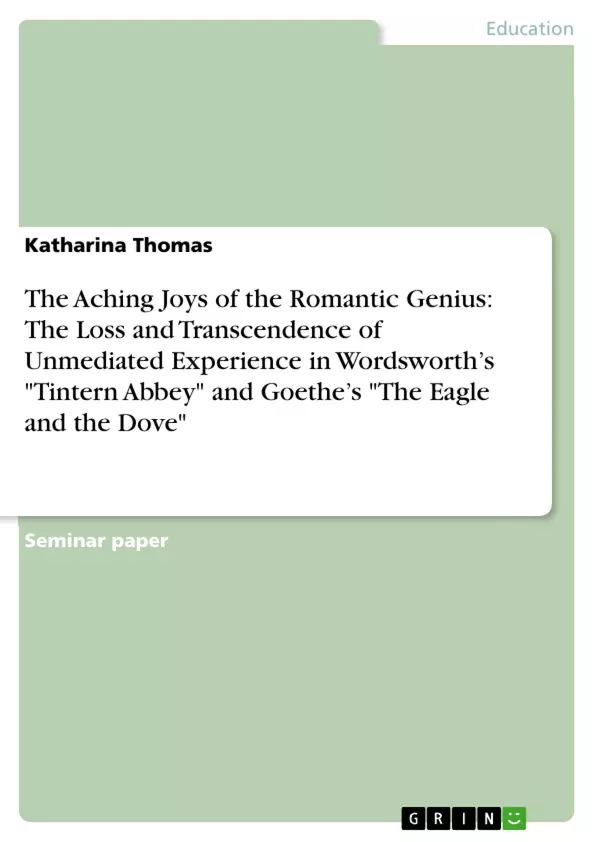What do Goethe and Wordsworth have in common? Or more precisely, what does Tintern Abbey have to do with Goethe’s Sturm und Drang poem The Eagle and the Dove? This paper will argue that while the poems may not share much at first glance, they voice similar feelings with respect to the experience of the Romantic Genius. The eagle’s loss of freedom and forced subjugation under a situation constrained by authorities echo Wordsworth’s description of the experience of his younger self. Similar to the eagle, the poet-figure in Tintern Abbey experiences a loss of that intensely emotional, unmediated engagement with the world. Wordsworth’s insight that he has received “abundant recompense” for this loss is foreshadowed in its incipience also in Goethe’s poem.
In order to establish this thesis, the first part of the paper provides an in-depth analysis of The Eagle and the Dove, elaborating on the concept of the romantic genius advanced by Goethe in the figure of the eagle. This analysis will also take into account differences between the English translation by Edgar Alfred Bowring and the German original, as the translation is not always felicitous. Since it would be beyond the scope of this paper to do a close reading of both poems in their entirety, the following part concentrates on a few central passages from Tintern Abbey, delineating the similarities between both poems with respect to the experience of the poet figure. Finally, it will analyse how Wordsworth transcends the loss of his former experience in relation to a similar development implicit in Goethe’s poem.
Inhaltsverzeichnis (Table of Contents)
- Introduction
- The Eagle and the Dove – the Genius Between Infinite Desire and Finite Conditionality
- Aching Joys and Dizzy Raptures - the Poet Figure in Tintern Abbey
Zielsetzung und Themenschwerpunkte (Objectives and Key Themes)
This paper aims to explore the shared feelings of Romantic genius in both Wordsworth's Tintern Abbey and Goethe's The Eagle and the Dove, despite the apparent differences between the works.
- The experience of Romantic genius and its limitations.
- The loss of unmediated experience and its impact on the poet.
- The concept of "aching joys" and the transcendence of loss.
- The role of authority and constraint in shaping the Romantic genius.
- The symbolic language and imagery used to convey the themes.
Zusammenfassung der Kapitel (Chapter Summaries)
The first chapter, "The Eagle and the Dove - the Genius Between Infinite Desire and Finite Conditionality," will focus on Goethe's poem and explore the symbolic representation of the Romantic genius as the eagle. It will analyze the imagery of constraint and limitation, as well as the idyllic setting of the eagle's confinement.
The second chapter, "Aching Joys and Dizzy Raptures - the Poet Figure in Tintern Abbey," will concentrate on Wordsworth's poem, analyzing the poet's experience of loss and the subsequent "abundant recompense" he receives. The chapter will explore how this experience mirrors the eagle's fate in Goethe's poem.
Schlüsselwörter (Keywords)
The main keywords of the text include Romantic genius, unmediated experience, loss, transcendence, authority, constraint, symbolic language, Tintern Abbey, The Eagle and the Dove, Wordsworth, Goethe, Sturm und Drang.
- Quote paper
- Katharina Thomas (Author), 2009, The Aching Joys of the Romantic Genius: The Loss and Transcendence of Unmediated Experience in Wordsworth’s "Tintern Abbey" and Goethe’s "The Eagle and the Dove", Munich, GRIN Verlag, https://www.grin.com/document/172959



